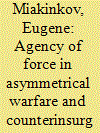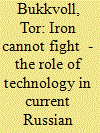| Srl | Item |
| 1 |
ID:
109488


|
|
|
|
|
| Publication |
2011.
|
| Summary/Abstract |
The use of force in asymmetrical warfare, and in counterinsurgency operations in particular, has been written off as strategically dangerous and politically irrational. The goal of the article is to examine the role of force in a modern military context and determine if victory through its application is theoretically feasible. This hypothesis will be tested against the backdrop of the conflict in Chechnya. The work will examine the Russian military and public policy as a subordinate subject to the overall inquiry of the article in an attempt to show that force was one of the major factors behind Russian military success in 2001.
|
|
|
|
|
|
|
|
|
|
|
|
|
|
|
|
| 2 |
ID:
109489


|
|
|
|
|
| Publication |
2011.
|
| Summary/Abstract |
Contemporary Russian military theory is dominated by three schools of thought: the 'traditionalists', the 'modernists' and the 'revolutionaries'. On the role of technology in future warfare, the traditionalists argue for both high tech and massive forces at the same time. The modernists are ready to trade manpower for technology, whereas the revolutionaries give technology full priority. Both the traditionalists and the modernists believe Russia, because of the country's technological lag and limited resources, should respond asymmetrically to the Western technology challenge. The revolutionaries, on the other hand, maintain that Russia must respond in kind. If not, the country will no longer be able to defend its sovereignty. The currently ongoing radical reform of the Russian military is a partial victory for the modernists, but which model or mix of models that will dominate in the future is first of all dependent on the Russian military's purchasing power and the state of the domestic defence industry.
|
|
|
|
|
|
|
|
|
|
|
|
|
|
|
|
| 3 |
ID:
109492


|
|
|
| 4 |
ID:
109491


|
|
|
|
|
| Publication |
2011.
|
| Summary/Abstract |
In recent years, China has made stunning progress in its satellite reconnaissance capabilities. Starting from almost no capacity for live surveillance ten years ago, today the PLA has gained the capability to support real-time tactical naval operations from space. China's suite of electro-optical, synthetic aperture radar, and electronic intelligence satellites would be key to its anti-access/area denial capabilities, through which the PLA could deny the United States military the capability to operate with impunity close to its shores. Furthermore, these achievements suggest a shift towards more military-dedicated space assets and form the contours of a crucial support system for expanded PLA operations.
|
|
|
|
|
|
|
|
|
|
|
|
|
|
|
|
| 5 |
ID:
109490


|
|
|
|
|
| Publication |
2011.
|
| Summary/Abstract |
This article addresses the following question: how can one explain the neglect of the intellectual aspects of the profession on the part of the Israel Defense Forces (IDF)? The explanations offered for that neglect are a mixture of cultural and societal factors. The cultural explanation focuses on Israeli strategic culture; the traditional Israeli perception of the combination of rich experience and experience-based intuition as a winning ticket; the tendency to extol improvisation; a cult of material strength; and a strong belief in technology. The social explanation stresses the declining attractiveness of a military career for qualitative young Israelis. The article contends that change can take place only if the IDF undergoes a process of institutional intellectualism - if not willingly then one imposed by the political echelon.
|
|
|
|
|
|
|
|
|
|
|
|
|
|
|
|